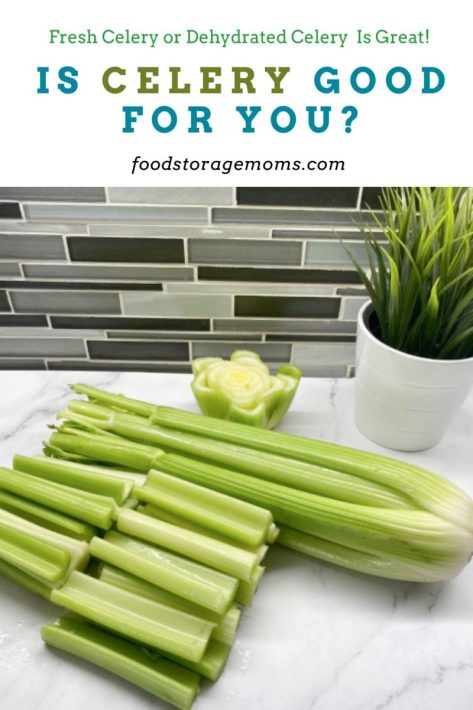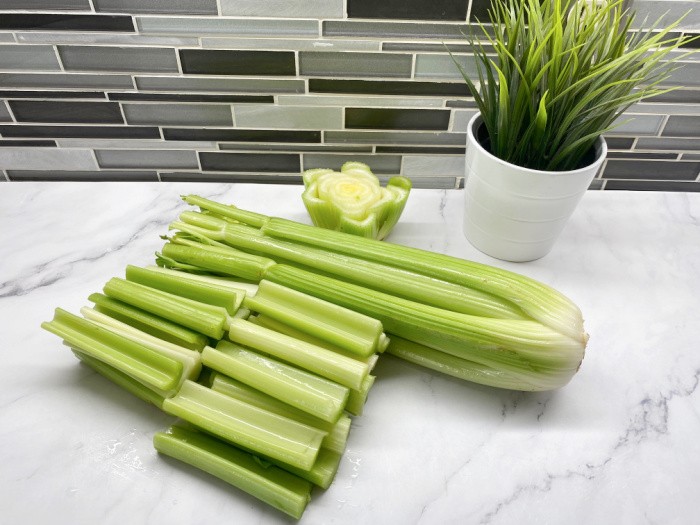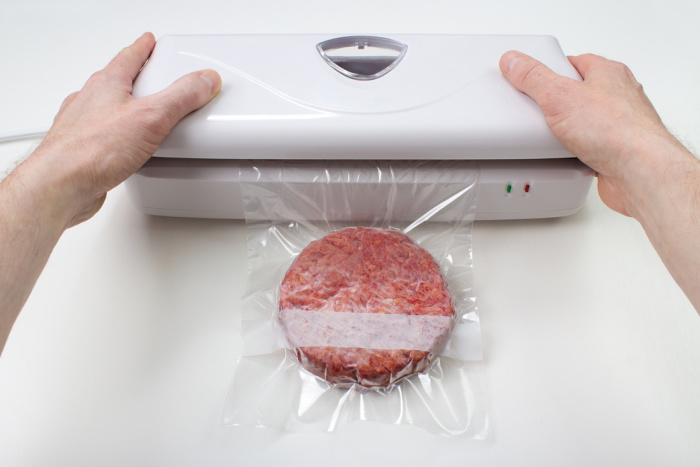Is Celery Good for You?
“Is Celery Good for You” is a question that comes up from time to time. As a matter of fact, as I was recently trying to decide what fruits and veggies I wanted to include in a new “drink juice daily” regimen, I wondered what the answer was as I evaluated various juices.
I found that the celery juice that comes from celery stalks helps with my nutrition needs.
Celery is often considered a negative calorie food because it takes more energy to digest than it contains. But that doesn’t necessarily mean that it isn’t good for you! Celery is a delicious snack to enjoy, especially when peanut butter is involved, but did you know that there are actually many reasons for you to eat more celery?
Some of the health benefits of celery that I’m going to share with you are just too good not to consider as you make vegetable choices. Not only can celery be a weight loss partner, but it may even have anti-cancer properties that can help with preventing cancer.
And that’s not all! Here are the top 10 reasons you should make this crunchy vegetable a regular part of your diet.

Is Celery Good for You?
High in Nutrients
While celery is considered low in calories, it also happens to be high in nutrients. Let’s consider some nutrition facts so you’ll understand why this is a great food to include in your meal plans. Celery nutrition certainly surprised me.
One cup of celery contains only 14 calories, but also contains essential vitamins and minerals including Vitamins K, A, C, folate, and potassium. Vitamin K is an important part of maintaining healthy blood, particularly the clotting factor as you try to maintain proper blood flow and injury repair.
There’s real value to having celery in your diet as a good source of Vitamin K.
Vitamin C is also an antioxidant that helps protect our cells against the effects of free radicals. Since Vitamin C is a water-soluble vitamin, we need to replenish a supply every day.
Good for Digestion
Celery is an excellent source of fiber. This is especially good news for those of you who struggle with digestive problems every once in a while. That’s because fiber helps with digestion and can also help lower cholesterol levels.
Keeping your gut healthy and functioning properly, means you are less likely to experience uncomfortable stomach symptoms like diarrhea or constipation.
Protects Cells from Damage
This next health benefit is too good for anyone to pass up! Celery contains antioxidants that can help protect cells from damage and cell death, and may also help reduce the risk of some chronic diseases such as cancer.
May Help You Lose Weight
Struggling to lose weight? Eating celery may be part of your answer. Celery is a natural diuretic, which means it can help flush excess water and sodium from the body. This can be helpful if you’re trying to lose weight or reduce bloating.
Since celery has very little sugar, it also helps you to maintain blood sugar levels that are healthy for you.
Since celery is a non-starchy vegetable, it isn’t high in carbohydrates and can be an important food source for those with diabetes.
Aids in Weight Control
Along with helping you lose weight, eating celery can also help you maintain your weight over time. This is because it’s high in fiber and low in calories, meaning it will fill you up without contributing many excess calories to your daily intake.
Celery has a high water content factor, so it helps to maintain proper hydration while helping you to feel full.
Contains Anti-inflammatory Properties
Are you someone that experiences excruciating knee pain on a regular basis? Celery is believed to have anti-inflammatory properties which may help reduce inflammation throughout the body. This can lead to better joint health and decreased pain levels.
Helps Regulate Blood Pressure
Eating celery regularly has been linked with lower blood pressure levels. This is likely due to the combined effects of the fiber, antioxidants, and anti-inflammatory compounds found in this vegetable.
Boosts Heart Health
Not only is celery rich in antioxidants, but it’s also high in potassium. This is good news for a couple of reasons, but especially because this can help improve heart health and lower your risk of developing heart disease.
Don’t count protein as one of the benefits of eating celery, it contains very little.
May Help Improve Brain Function
The nutrients in celery may also help improve brain function and protect against age-related mental decline. This includes memory loss and cognitive decline.
Promotes Healthy Skin
Celery contains lots of Vitamin A, which can help keep skin looking young, healthy, and radiant. It may also be helpful for anyone struggling with acne or other skin conditions.
Provides Minerals that Support Good Bone Health
Celery is a good source of vitamins and minerals that are essential for bone health including calcium, magnesium, phosphorus, and Vitamin K.
May Lower Your Risk for Certain Cancers
The compounds in celery have been shown to interfere with the growth of certain types of cancer cells in test tube studies. More research is needed to confirm these effects in humans, but eating celery regularly may help lower your cancer risk.
Keeps You Hydrated
Celery is also high in water content, making it an excellent hydrating food that can help keep you hydrated throughout the day. This is especially important if you’re physically active since staying hydrated is vital for your body’s performance and health.
Celery Can Be Enjoyed in a Number of Different Ways
Adding celery to your diet is a great way to increase your intake of important vitamins, minerals, and antioxidants while staying within your daily calorie goals! And there’s no need to limit yourself to eating it raw – celery can be enjoyed cooked or steamed as well.
So go ahead and add this superfood to your shopping list today!
Tips for Buying and Using Celery
1. When buying celery, look for stalks that are firm and have crisp leaves. Avoid any stalks that appear limp or wilted, as this may indicate that they are old or have been exposed to moisture.
2. To store your celery, keep it in your refrigerator’s crisper drawer and use it within one to two weeks.
3. Celery can be used in a wide variety of dishes, both cooked and raw. It is commonly added to soups, stews, salads, or braised dishes for extra flavor, texture, and health benefits.
4. If you’re looking for ways to incorporate more celery into your diet, try using it to make homemade vegetable broth or add some chopped stalks to a green smoothie. You can also use celery leaves as a garnish for soups, salads, or casseroles.
5. Finally, don’t forget that you can enjoy celery in its whole form – simply wash and eat raw! Whether sliced into strips, chopped into cubes, or served whole as a crunchy snack, celery is a versatile and healthy food that everyone can benefit from adding to their diet.
I like to store my celery in reusable containers designed for the refrigerator. Refrigerator Containers
More Tips for Eating Healthy:
- How To Dehydrate Celery + Celery Powder
- What You Need In Your Working Pantry
- How to Be Ready for Thanksgiving
Are some people allergic to celery?
There are people who have a celery allergy and reaction to celery, celery seeds, and celery extract. It seems to be more common to people who suffer from hay fever due to proximity to birch and/or mugwort pollen.
The allergy appears more often in Europe and has many of the following symptoms:
- Asthma attacks
- Hives, itching, and rash on the skin
- Headaches
- Difficulty breathing
- Stomach pain and cramps
- Nausea with vomiting and diarrhea
What are the celery benefits for women in particular?
We’ve covered the majority of health benefits for people of both genders, but let’s summarize the major health benefits that women may be most interested in:
- Celery is a great source of antioxidants. These nutrients help protect our cells, including blood vessels and organs.
- It provides support for healthy digestion. This mainly comes from the high fiber content found in celery.
- Help reduce inflammation. Inflammation contributes to body pain and discomfort of all kinds.
- It helps us stay hydrated. We need plenty of water to support all our body functions.
- Celery is a great snack. You can eat celery in place of the sweets we enjoy so much. Just grab a celery stalk and much away without feeling guilty. Could help us all lose a little weight along the way.
- High-nutrition foods benefit us all, and celery has a number of nutrients we can use every day.
Are the parts of the celery plant, like the leaves and seeds, also beneficial?
You should try to incorporate all the parts of the plant as you put celery to work in your meal plans. Each part contributes to the flavor of foods in a unique way. Some people use the leaves as a garnish, much like parsley.
The seeds are often added to bread recipes and when making pickles. The seeds also can be processed to make celery seed oil and used as a skin treatment.
Final Word
Celery often gets a bad rap as being a “negative calorie” food because it takes more energy to digest than it contains, but there are actually many reasons to make this crunchy vegetable a regular part of your diet!
From its nutrient density and low-calorie content to its potential health benefits, celery without question deserves a spot on your plate! Go ahead and stock up next time you’re at the grocery store, your body will thank you! May God Bless this world, Linda






















We use celery seed in our stuffing mix since my wife doesn’t care for celery but doesn’t mind celery seed. Still adds a hint of the flavor and we get the benefits of the seed rather than just flavored breading.
Appreciate these reminders of various foods and their nutritional value. Always like to say a varied diet is a healthy diet. 🙂
Thanks Linda!
Hi DMWalsh, thank you, my friend. You know since it’s January, I’m trying to get on a healthy food diet. It’s hard, but I am stocking up on more foods and eating them every day. I’ll keep you posted, I have to for my health, life is good if your body feels good! Linda
Linda,
Celery is a staple in my salads, soups and stews, plus I eat it raw or with peanut butter. The best way to keep celery fresh in your crisper drawer is to wrap it in aluminum foil. It lasts a lot longer that way.
Hi Ray, WHAT? You store it in aluminum foil! Oh my gosh, how did I not know that!!! I love tips like this! Thank you! Linda
Linda,
Learned that tip from my mom. It works really well. I’ve never tried it with any other veggie, but now you’ve got me thinking I should.
Hi Ray, we may all be using aluminum foil now, I love it! Linda
Linda,
The only drag about celery is the seeds are so minute it is difficult to plant and grow. You have to simply scatter them on the surface, mist them with a spray bottle, then sift a very light coating of soil over them and mist the whole thing again. You must use a spray bottle with a fine mist, otherwise you’ll simply float the seeds away. So, basically it’s a PITA to plant, but like other veggies grown in your own garden, it tastes MUCH better than what you get from a store. Utah Tall is the only celery I’ve been able to get to grow in my garden.
Hi Ray, I will have to try Utah Tall celery seeds, thanks for the tip! I will try your technique on how to plant them as well. Love it! Linda
OOH, that reminded me, I have celery in the fridge. Bumps/ants on a log anyone? Take the celery, put peanut butter on it and add raisins, stick them in the peanut butter along the stalk. Quick ,easy snack for kids. Big kids (aka Me) like it too.
Hi Kathy, oh my gosh, I haven’t had one of those in years!! I’m heading to the store to pick up some celery, I will make those for my lunch! Great idea! Linda
Love celery! It is so versatile. I also have used aluminum foil to keep my celery fresh – mom did that many, many years ago!
Things I do with celery: of course, I eat celery sticks with cheese, nut butter/raisins (or preferably dried cranberries!), use in soups and stews. I could not make my mom’s homemade stuffing without celery. BUT, when I buy celery, I like to get those with a lot of leaves on them! I dehydrate the celery leaves (and the really tiny, tender stalks) to use in soups and stews – sort of my substitution for celery seeds. If I find that I am not using the celery in a timely manner, I chop and dehydrate the stalks to use later either in whole or powdered for flavor. I also combine dehydrated chopped celery with dehydrated chopped onion and diced/cooked dehydrated carrots for a dehydrated mirepoix. I simply rehydrate, drain any excess water and sauté as needed for my dish. Handy to have on hand. I can also just toss a handful of the dehydrated mixture into my soup or stew.
HI Leanne, I was just telling my husband how much I love dehydrated celery and powder! I just placed my new celery stalks in some foil, best tip ever! Linda
Don’t get me wrong, I love celery (especially “ants on a log” with dried cranberries instead of raisins!)–but I *did* have to giggle over someone’s description of celery as “stiff water with hair in it”!
Hi Rhonda, Oh my gosh, I would get the giggles over that as well! LInda
Thanks for this great info on Celery. I do keep my celery in foil and the other thing you can always find wrapped in foil in my veggie drawer is BROCCOLI. I am amazed at how using foil really keeps these two vegetables fresh for such a long time. I also dehydrate Celery and powder it for those times that I don’t have any fresh. Sometimes I mix it into the mayo for chicken or tuna salad. May we all continue to learn these tips and ways to prolong the life of our fresh foods. I always learn so much at this site. Thank you Linda and all the ones who comment as well.
Hi Carol, well now I learned another way to keep broccoli fresh, with foil!! I am going to do that now!! Thank you for that great tip! Linda